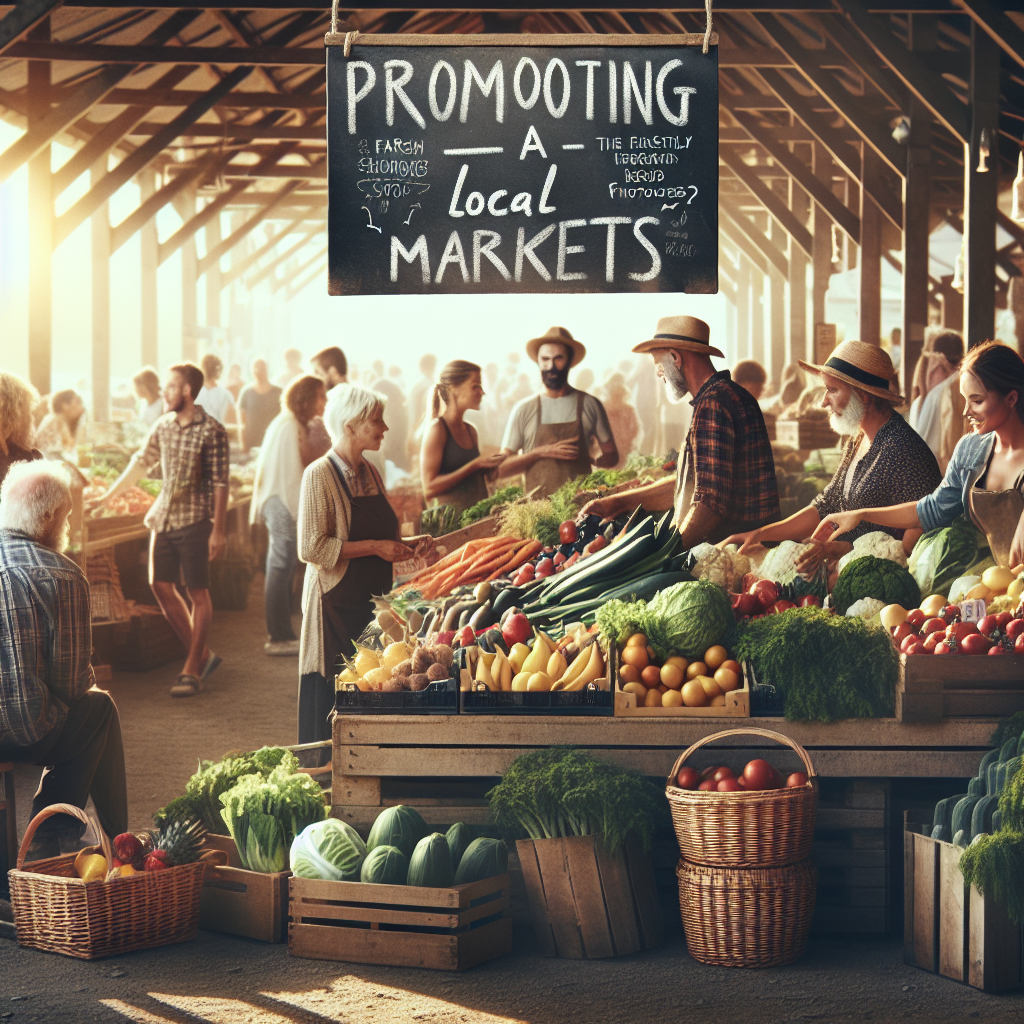An Introduction to Local Farmers Markets and Their Impact
Did you know there are over 8,600 farmers markets registered in the USDA Farmers Market Directory? But have you ever wondered what exactly defines these markets as local? Or why they matter? Have you considered the economic and health benefits that come with frequenting such markets?
Today, we’re going to explore these questions, discussing what a local farmers market is, its key characteristics, and how it serves as a heartening display of community, environmental sustainability, and overall well-being. By the end of this reading, you’ll not only understand the importance of these incredible marketplaces but also find some handy tips if you’re thinking of showcasing and advertising your farm products.
Without further ado, let’s get started on the beautiful process of understanding and appreciating local farmers markets!
What is Considered a Local Farmers Market?
Definition and Purpose
A local farmers market is a community-based marketplace where farmers and producers sell their goods directly to consumers.
These markets aim to provide fresh, locally grown produce and foster connections between farmers and their communities.
Characteristics of a Local Farmers Market
Local farmers markets often share several common characteristics:
- Direct sales from farmers to consumers
- Seasonal opening periods, often aligning with growing seasons
- Variety of products including fresh produce, baked goods, cheeses, and meats
- Prominent presence of small and local businesses
Benefits of Local Farmers Markets
Shopping at a local farmers market offers multiple benefits:
- Fresh and seasonal products
- Reduced environmental impact due to less transportation
- Supporting local farmers and boosting the local economy
- Community engagement and education on sustainable practices
Key Indicators of Locality
Understanding what makes a farmers market “local” involves several factors:
| Factor | Description |
|---|---|
| Distance | Typically within 50-100 miles from the market location |
| Vendor Requirements | Sellers must often produce their goods within a defined local area |
| Freshness | Products are usually harvested or made shortly before the market |
| Community Presence | Operated by local organizations or initiatives |
Regulations and Guidelines
Local farmers markets are often governed by specific regulations which might include:
- Health and safety standards for food handling and sales
- Requirements for vendor certification
- Guidelines for organic labeling and sustainable practices
For more detailed information on market rules and guidelines, visit the USDA’s website.
Types of Products Commonly Found
At a local farmers market, you can expect to find:
- Seasonal fruits and vegetables
- Artisanal cheeses and dairy products
- Freshly baked bread and sweets
- Eggs and meats from local farms
- Handmade crafts and specialty items
Each market may have unique offerings depending on regional specialties and farm production schedules.
Economic and Health Benefits of Local Farmers Markets
The Economic Upside
One of the significant advantages of local farmers markets is their positive impact on local economies. When shoppers choose to purchase goods directly from local farmers, that money stays within the community and helps it grow.
- Job Creation: Sellers at farmers markets often employ local staff, creating meaningful job opportunities within the area. These jobs help reduce unemployment and strengthen the community.
- Stimulating Local Economies: By spending your dollars in your community, you’re literally investing in your locale. USDA’s Economic Research Service confirms that this act helps stimulate economies by giving farmers more resources to grow their businesses and hire more local workers.
Health Benefits
Besides their positive economic impact, local farmers markets also offer substantial health benefits. Here’s how:
- Nutrient-Rich Produce: Simple fact, fresher food is more nutritious. In a farmers market, fruits and vegetables are often picked at peak ripeness, which is when their nutrient content is highest. This differs significantly from supermarket produce, which is often harvested prematurely.
- Access to Organic and Non-GMO Products: Many local farmers follow organic farming practices and avoid genetically modified organisms (GMOs). This provides a plentiful and easily accessible source of clean, health-supporting foods for the community.
- Encourages Healthier Eating: Having easy access to fresh, tasty produce often encourages healthier eating habits. It’s much easier to reach for that crisp apple or enjoy some fresh greens in your salad when they come from just a few miles away and taste better than ever.
Promoting Food Sovereignty
Local farmers markets can play a significant role in promoting food sovereignty. Food sovereignty refers to the right of people to healthy and culturally appropriate food produced through ecologically sound methods. It also involves communities having control over their food systems, including markets, ecological resources, food cultures, and productive lands.
- Safeguarding Local Food Culture: By providing local and often unique produce, these markets help preserve local food cultures and traditions that might be overlooked by larger grocery chains.
- Providing Food Security: By fostering a system where food is grown, sold, and bought within the same community, farmers markets can help secure a stable food supply.
Enhancing Quality Of Life
Farmers markets offer more than just food – they provide a place to reconnect with our communities and enjoy the direct interaction between producers and consumers.
- Social Interaction: Local markets are social spaces promoting a sense of community through various activities such as entertainment, contests, cooking demonstrations, and educational events.
- Learning Opportunities: These markets can also serve as educational forums where consumers can learn more about where their food comes from, how it’s grown, and ways to use and preserve it.
Why is it Important to Shop at Local Farmers Market?
Support for Local Farmers
When you shop at local farmers markets, you directly support local farmers, which in turn benefits the entire community.
- Income Stability for Farmers: Local farmers often face economic challenges, and by purchasing directly from them, you ensure that they receive a fair price for their products. This can help them sustain and expand their farming operations.
- Understanding Your Food Source: Building relationships with farmers means you can ask questions about how your food is grown, what farming methods are used, and any special practices or varieties they might cultivate.
Environmental Sustainability
Shopping locally is environmentally friendly and promotes sustainable agricultural practices.
- Reduced Carbon Footprint: Local food requires less transportation, which cuts down on greenhouse gas emissions. This is a critical factor in mitigating climate change.
- Sustainable Farming Practices: Many small-scale farmers use environmentally-friendly farming methods such as crop rotation, organic farming, and minimal pesticide use, which helps maintain soil health and biodiversity.
Building Community Connections
Local farmers markets act as gathering places where community connections are formed and strengthened.
- Community Bonds: These markets offer a unique social atmosphere where neighbors can meet, chat, and build a stronger sense of community.
- Educational Opportunities: Farmers markets often host workshops, cooking classes, and other educational events that provide community members with valuable knowledge on nutrition, cooking techniques, and sustainable living.
Economic Resilience
A thriving local farmers market contributes to the financial stability of the community.
- Diversified Local Economy: Farmers markets can help diversify the local economy by providing a platform for various local products and services, from food to crafts and handmade goods.
- Resilience Against Economic Shocks: A strong local economy with engaged local producers and consumers is more resilient to global economic fluctuations, helping create a more stable community.
Access to Unique and Specialty Items
Local farmers markets often provide products that you might not find in a conventional grocery store.
- Varietal Diversity: Farmers markets may feature heirloom varieties of fruits and vegetables, unique dairy products, and handmade crafts that showcase regional specialties and cultural traditions.
- Innovative Products: Local producers often experiment with new flavors, recipes, and sustainable practices, bringing innovative and unique products to market.
By choosing to shop at local farmers markets, you support not just farmers but also your broader community, environment, and local economy. For further reading, the LocalHarvest website offers additional insights into the benefits of local food systems.
How to Advertise Your Farm
Leverage Social Media Platforms
Social media is a powerful tool to reach a broader audience. Platforms like Facebook, Instagram, and Twitter allow you to connect directly with potential customers.
- Create Engaging Content: Share photos and videos of your farm, crops, and farming process. Behind-the-scenes glimpses can humanize your brand.
- Run Ads: Social media advertising allows you to target specific demographics, such as local food enthusiasts.
- Host Live Events: Live streaming farm tours or Q&A sessions helps engage your audience in real time.
Build a User-Friendly Website
A well-designed website serves as a central hub for your farm’s online presence.
- Include Essential Information: Ensure your website contains details about your products, farming methods, and contact information.
- Optimize for SEO: Use relevant keywords to improve your search engine rankings. This makes it easier for people to find your farm online.
- Online Store: Adding an e-commerce section allows customers to purchase directly from you, offering convenience and boosting sales.
Partner with Local Businesses
Collaborating with local businesses can open new avenues for advertising.
- Sponsor Events: Partner with local restaurants or community events to showcase your produce.
- Offer Tastings: Provide samples at local shops or farmers markets to introduce people to your products.
- Supply Restaurants: Establish partnerships with local eateries that emphasize farm-to-table dining.
Utilize Email Marketing
Email newsletters are an effective way to keep your customers engaged.
- Regular Updates: Send out weekly or monthly newsletters with farm updates, seasonal produce availability, and special offers.
- Exclusive Content: Offer subscribers unique content such as recipes, farming tips, or discount codes.
- Segment Your Audience: Tailor your messages to different customer groups for more personalized communication.
Get Involved in Community Events
Participating in community activities helps boost your farm’s visibility and fosters local support.
- Attend Farmers Markets: Being a regular vendor at local farmers markets helps build a loyal customer base.
- Hold Workshops: Offer educational workshops on topics like organic farming, gardening, or cooking with fresh produce.
- Donate to Local Causes: Supporting community initiatives can increase your farm’s goodwill and visibility.
Utilize Print Media
While digital marketing is crucial, traditional media shouldn’t be overlooked.
- Local Newspapers: Advertise in community newspapers to reach an older, local audience.
- Flyers and Brochures: Distribute these at local events, shops, and eateries.
- Community Boards: Post on bulletin boards at libraries, community centers, and local businesses.
By implementing these strategies, you can effectively advertise your farm and reach a wider audience, helping you grow your business and connect with your community. For more detailed strategies and advice, check out the resources on Small Farm Nation.
Wrapping it Up: The Power of Local Farmers Markets
Local farmers markets are much more than venues for purchasing fresh, seasonal produce. They represent community-building platforms that directly support farmers, bolster local economies, and promote sustainable agriculture. By shopping at one, you not only access organically grown, nutrient-rich food but also play a critical role in fostering food sovereignty, protecting biodiversity and enhancing community bonds. Meanwhile, for local farmers looking to expand their reach, advertising methods ranging from leveraging social media to attending community events and implementing email marketing can be beneficial. In summary, these vibrant markets contribute significantly to sustainable agriculture, healthier communities, and stronger local economies.
Frequently Asked Questions – FAQs
What is the definition of a local farmers market?
Local farmers markets are community-centric marketplaces where farmers sell their fresh, locally grown produce directly to consumers.
What are the benefits of shopping at local farmers markets?
Shopping at local farmers markets offers several benefits including access to fresh and seasonal products, reduced environmental impact due to less transportation, and support for local farmers and local economy. They also offer an opportunity for community engagement and education on sustainable practices.
What factors define a ‘local’ farmers market?
A local farmers market is typically defined by factors such as the distance from the market location (commonly within 50-100 miles), vendor requirements that involve selling goods produced within a defined local area, freshness of products which are usually harvested shortly before the market opens, and community presence, being operated by local organizations or initiatives.
What economic and health benefits do local farmers markets offer?
Local farmers markets have significant economic benefits, including job creation and stimulating local economies. Health-wise, they provide nutrient-rich produce and access to organic and non-GMO products, encouraging healthier eating habits.
Why is it important to support local farmers markets?
Supporting local farmers markets directly aids local farmers, fostering income stability for them and greater understanding of our food sources. It also promotes environmental sustainability, builds community connections, and contributes to economic resilience. Plus, they often offer unique and specialty items you may not find elsewhere.
How can a farmer effectively advertise their farm?
Farmers can leverage social media platforms, build a user-friendly website, partner with local businesses, utilize email marketing, get involved in community events and utilize print media to advertise their farms effectively.






